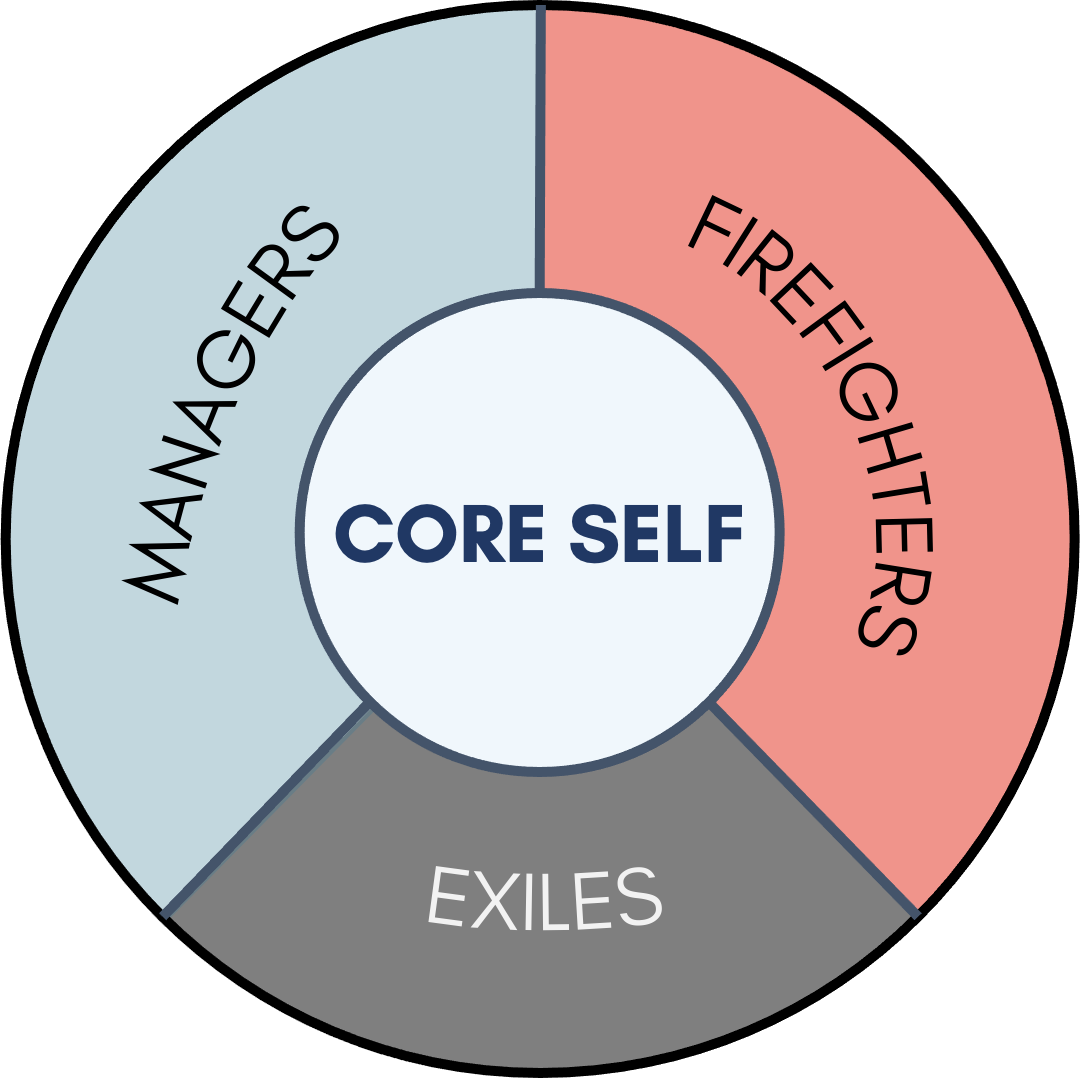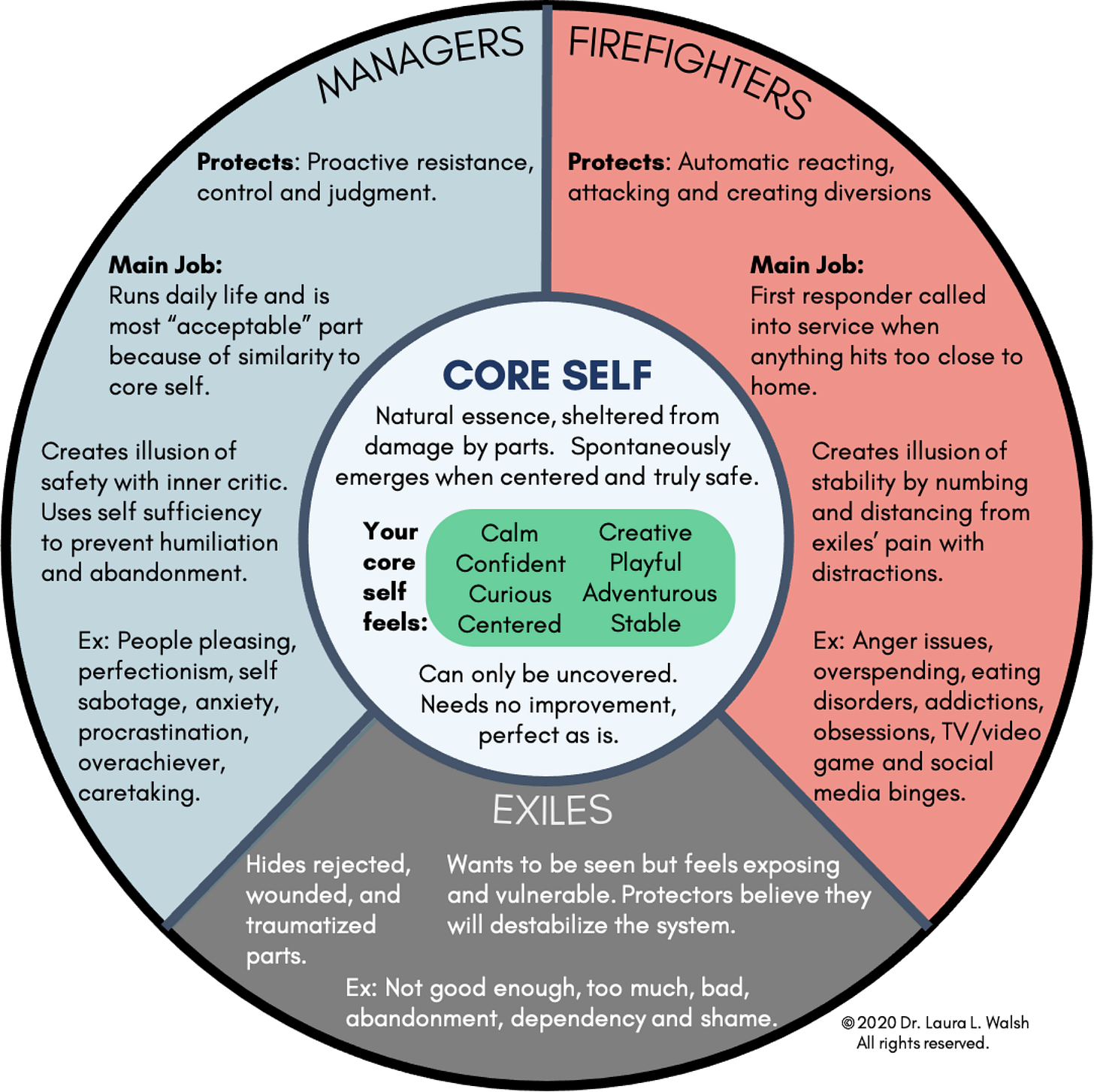Know Your Mind: The Basics of Internal Family Systems (IFS)
A part of you wants to understand your messy brain and another part....

It’s time to understand the inside of your head. It’s messy in there but we can tidy it up. Dream a little - what if your mind could be an awesome and wonderful place? An oasis or retreat, available to you anytime – the middle of the night or right when you need to perform. The answer is Internal Family Systems – a theory about our parts. It makes intuitive sense – we already talk the parts of us – but once you get the hang of it, you’ll turn your mind into a superpower. Let’s get started.
The Basics
Internal Family Systems or IFS is a psychological theory by Dr. Richard Schwartz that intuitively maps the inside of the mind. In the center is the observing Self and around it is different kinds of parts. Think of it as a CEO and a bunch of VP’s. We are at our best when we’re able to look through the lens of the Self. It’s the times when you’re the most calm, creative, playful and wise. You know what to do about things and aren’t criticizing yourself. Sounds great, right? The crappy times come when we’re stuck inside the lens of a part. Whatever is going on seems like it’s going to be this way forever. Whether it’s beating yourself up or worrying about something, parts skew the accuracy of the world.
This is how the IFS website describes the theory:
"IFS is a transformative tool that conceives of every human being as a system of protective and wounded inner parts led by a core Self. We believe the mind is naturally multiple and that is a good thing. Just like members of a family, inner parts are forced from their valuable states into extreme roles within us. Self is in everyone. It can’t be damaged. It knows how to heal."
Introducing You to Your Parts
Trust me when I say this theory just makes a lot of sense. Think of all the times you’ve referred to the parts inside you: A part of me wants to work out and another part wants to eat cookies. Alternatively, they can show up as voices in your head: I’m so irresponsible. For me, it’s a combo of a phrase and a feeling cloud so the thought ends up being something like this: A whispered irresponsible or simply, ugh, followed by a noxious cloud of shame and judgement. If I’m lucky, my centered self shows up and turns me right side up, confidently asserting: You’ve got something hanging over your head to do. Just do it and you’ll feel better.
Dr. Schwartz defines the parts as the Self, Managers, Firefighters and Exiles but I break it up into the centered Self, protectors, and younger selves. Yes, those seemingly negative voices are attempting to protect you; they’re just underinformed and form child-like conclusions. It’s the Self’s job to figure out what’s up and set everything straight.
Managers
These are the voices that sound most sane and like the centered Self. They can be rather bossy and love to tell you what you ought to do. My Manager is chronically critical and irritated. She’s the one I quoted above on being irresponsible. She’s sure to pipe up and tell me when the house is too messy or I’m gaining weight. She used to be hypercritical and mean, saying things that seemed true like: You’re such a slob or You’re too fat to go to The Gap. Other people may experience the voice as very opinionated - how you’re falling short compared to your peers or how you should work long hours to make up for everyone having to deal with you.
Firefighters
I think of Firefighters as First Responders because they jump to your defense whenever you feel crappy. Filled with good intentions, they’re also impulsive, reactive and operate best in a crisis. Their suggestions are helpful in the moment but ultimately, just delay dealing with things. Also, how they “solve” problems can run you in circles. For instance, if the Office Manager wounds me by saying I’m gaining weight, a First Responder jumps into action to bring me some cookies. Because cookies make everything better. And they do, in the moment.
Child Problem Solving
Together, Managers and Firefighters are relics from childhood problem solving. They learned to cope as children do and thus draw from a limited database of ideas. When you got a scrape on the knee, a kiss from mom whisked the mental and physical pain away. She’s just given you a story about how to resolve pain. The next time you get a scrape, you’ll look to her to fix it. It’s like that – a mixture of wishful thinking, lack of evidence and unevolved knowledge. Kid-sense tells you that a kiss on your owie makes it all better.
Our parents and primary relationships, shape the foundation of how the parts speak inside us. It’s all about patterns. Ideally, mom kisses all the owies and you internalize Mom’s kiss solution as self-soothing. If your parents responded to your woes with soothing, you get a self-soothing voice in your head. But parents aren’t perfect and some are mediocre to terrible. They’re also limited by whatever voices they got as kids. Other people from childhood, like siblings, teachers, friends and the meanies, make an impact as well. Most adults don’t have strong self-soothing voices but once you realize it’s important, you can develop it. But we’ll get to that. Back to kid reasoning.
Children aren’t sophisticated thinkers. They haven’t come up with philosophical reasons why bad things happen. Lots of adults haven’t either! Kids try to figure out why something went wrong or hurts and unless a parent swoops in to give another story, usually conclude that it must be all their fault. As a result, their sense-making and problem-solving strategies are limited to what they’ve learned so far. This happens with even the best parenting and is understandably worse with less ideal parents.
So, it makes sense that when a part of you criticizes, another part jumps to soothe the mental owie with immediate and simplistic strategies. A kiss, a cookie makes it all better. It’s the root of procrastination too – putting things out of our minds removes the bad feeling. Not all strategies these protectors offer are bad or maladaptive – it’s the overreliance. Too many solution cookies add to the problem and when the Self steps in, that’s things truly get better.
Exiles
This kind of part is called an Exile because it’s typically been banished to the basement of your mind. If you lock it out of sight and can’t hear it’s protests, you can generally maintain calm on your surface day to day. I call mine the Little Girl. But they are so darn whiny and emotional. It’s hard to love them at first but that’s the best way to handle them. Exiles are generally younger, wounded parts of us. They hold the burdens of our past. When they start to protest, that’s when the managers and firefighters react.
See, Exiles are in pain and cry out for attention in different ways. When they do, the protector parts step in to distract. I’ll give you an example. I’ve been in a situation where I had a lot of boring and stressful things on my plate. My to-do list included picking a health plan for the next year, doing laundry before a weekend trip, uploading a document for my lease, and getting to the grocery store. I had to fit all of this in to my work week. Most of these tasks are simple but some are loaded with extra mental work. The sum total of it all felt heavy. My Little Girl started to worry and a Manager stepped in to insinuate that I was flaky and irresponsible. Such a know it all! The chorus of these two didn’t feel good so of course, the Firefighter/First Responder perked up. While I’m starting to worry about all I’ve got to do and feel slightly irresponsible for not diving in, I ultimately ate some cookies while shopping on Amazon. Seem familiar?
The Self
I hate to pick favorites but if I did, it would be the Self. It’s the sanest part of me. It’s not fair to think of it as a part; it’s more the core that holds everything else together. It’s the central hub of all activity and when working properly, manages the inside of your mind. The Self stepped in to resolve all the noise with my parts and sorted out the tasks. It tells me that I’ll feel better if I take action in regard to my to-do list. It’s advice is to break things into steps to get it done. Once I started checking things off, my Little Girl quieted down and the Manager drifted into the background. The Firefighter, now not needed, also retreated. The parts trust my Self to resolve the knots and tangles of life.
When you’re in your centered Self, you can observe yourself and the world with an eye towards assessment over judgement. Dr. Schwartz defines key qualities of the self as calmness, clarity, curiosity, compassion, confidence, courage, creativity, and connectedness. When you’re seeing the world through this lens, you’re a bit separated from the fray of the parts. This separation allows you to watch them. You might think something like: Wow, I’m really having a reaction to this.
What’s the Point?
You now have the basics of the IFS theory for understanding the inside of your head. At least intellectually, you get that you have a centered self that (can or should) run things as well as two protective categories of parts (managers and firefighters) and underneath it all, the wounded exiles. There’s so much more we can talk about and ways to apply IFS to different situations, but we’ll leave it here for now. Check out my essays on Your Parts and Writer’s Block, You and Your Grieving Parts and Your Core: The Big Four on how to apply the theory to real life.





